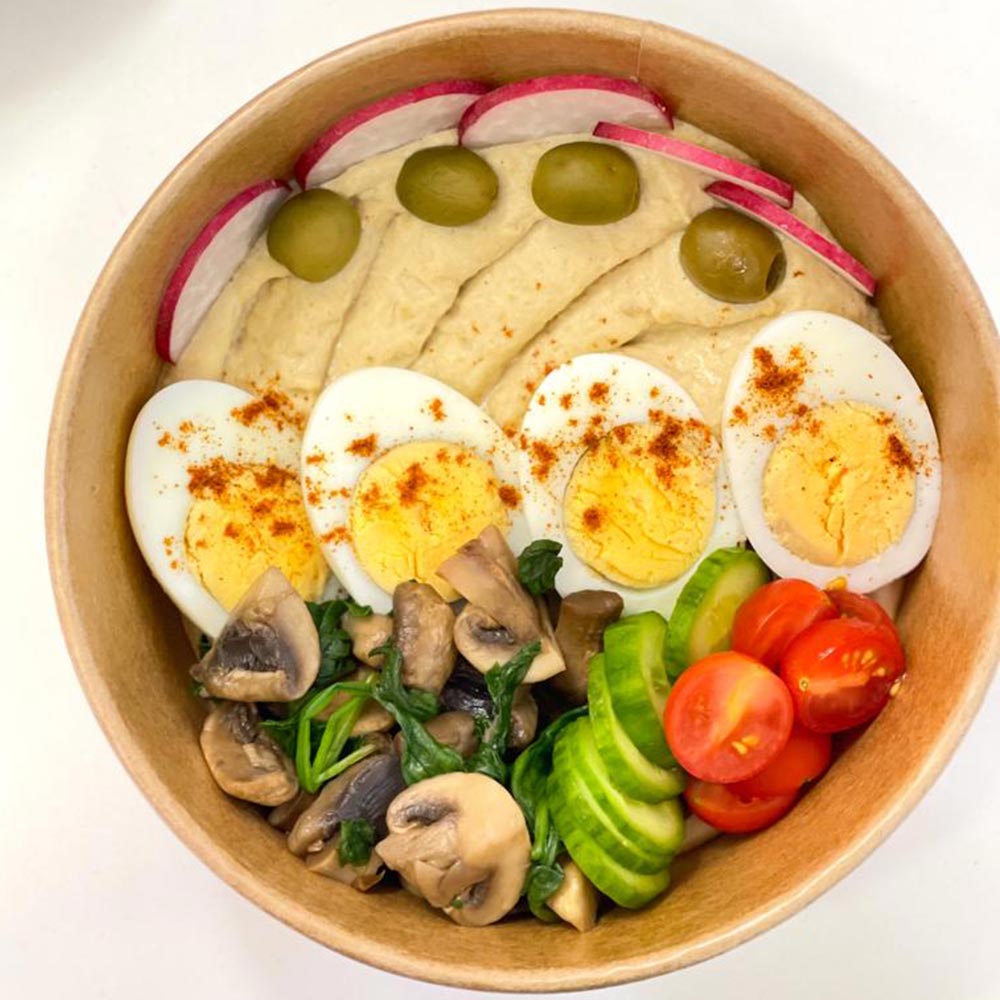A customized meal plan is a personalized nutrition program that takes into account your age, weight, height, activity level, health conditions, allergies, and food preferences. It tells you what to eat, how much to eat, and when to eat, based on your specific needs and goals. Creating a customized meal plan for weight loss in Dubai is not hard if you follow these steps. It can help you enjoy the benefits of healthy eating without feeling deprived or bored. It can also help you achieve lasting results that improve your overall well-being. In this post, we will guide you through the process of finding the right foods, planning your meals, incorporating local flavors, and sticking to your weight loss journey. So let's get started on your path to a healthier lifestyle!

Benefits of a Customized Meal Plan for Weight Loss
Embarking on a weight loss journey can be
challenging, but with a customized meal plan, you can achieve your goals with
ease. Here are some of the benefits of having a personalized meal plan:
1. Helps you achieve your weight loss goals: A customized
meal plan takes into account your specific needs and goals, providing you with
a roadmap to success.
2. Promotes a healthy lifestyle: With a personalized meal
plan, you can ensure that you are nourishing your body with nutrient-dense
foods, leading to overall health and well-being.
3. Provides personalized guidance and support: Working
with a professional to create your meal plan gives you access to expert advice
and support tailored to your unique needs.
4. Increases your chances of long-term success: By
following a customized meal plan, you develop healthy habits that can be
sustained for the long term, leading to lasting weight loss results.
5. Can be tailored to your dietary preferences and restrictions: Whether you have dietary restrictions or preferences, a personalized meal plan can be adjusted to accommodate your needs, ensuring a delicious and enjoyable journey.

Finding the Right Foods for Your Weight Loss Journey
When it comes to weight loss, the foods you choose to eat
play a crucial role in your success. Here are some tips for finding the right
foods for your weight loss journey:
1. Focus on whole, unprocessed foods: Whole foods such as
fruits, vegetables, whole grains, and lean proteins should be the foundation of
your meal plan. Avoid processed foods that are high in added sugars, unhealthy
fats, and artificial ingredients.
2. Incorporate plenty of fruits and vegetables: Fruits and
vegetables are low in calories and high in nutrients. Aim to include a variety
of colorful fruits and vegetables in your meals to ensure you're getting a wide
range of vitamins, minerals, and antioxidants.
3. Choose lean protein sources: Protein is an essential
nutrient for weight loss as it helps to keep you full and satisfied. Opt for
lean protein sources such as chicken breast, fish, tofu, and legumes.
4. Opt for complex carbohydrates: Complex carbohydrates,
such as whole grains, provide long-lasting energy and are packed with fiber.
They can help you maintain stable blood sugar levels and keep you feeling full
for longer.
5. Avoid sugary and processed foods: Sugary and processed
foods can hinder your weight loss efforts. They are often high in calories,
lack nutrients, and can lead to cravings and energy crashes. Opt for healthier
alternatives and limit your intake of sugary treats.
Remember, finding the right foods for your weight loss journey is about nourishing your body and making choices that support your health and well-being. Consult with a registered dietitian or nutritionist to create a customized meal plan that suits your specific needs and preferences.

Planning Your Meals According to Your Weight Loss Goals
When it comes to creating a customized meal plan for weight
loss, it's important to consider your goals and make sure your meals
align with those objectives. Here are some tips to help you plan your meals
effectively:
1. Set clear and realistic goals: Before you start
planning your meals, define your weight loss goals. Be specific about how much
weight you want to lose and the timeframe in which you want to achieve it.
2. Determine your calorie needs: Calculate your daily
calorie needs based on your age, gender, activity level, and weight loss goals.
This will give you a starting point for planning your meals.
3. Divide your daily calorie intake into meals and snacks: Once
you know your daily calorie goal, divide it into meals and snacks throughout
the day. This will help you maintain a steady energy level and prevent
overeating.
4. Include a variety of nutrients in each meal: Make sure
each meal is balanced and provides a mix of protein, carbohydrates, and healthy
fats. This will keep you satisfied and provide essential nutrients for your
body.
5. Allow for flexibility and occasional treats: It's important to have some flexibility in your meal plan to accommodate cravings or social events. Allowing yourself occasional treats can help you stay motivated and prevent feelings of deprivation.

Creating a Balanced and Nutritious Meal Plan
When creating a meal plan for weight loss, it's
important to focus on balance and nutrition. Here are some tips to help you
create a plan that supports your goals:
1. Include all major food groups: Make sure your meal plan
includes a variety of foods from each food group, such as lean protein, whole
grains, fruits, vegetables, and healthy fats.
2. Ensure portion control: Pay attention to portion sizes
to maintain a healthy calorie intake. Use measuring cups or visual cues to help
you gauge proper portions.
3. Prioritize nutrient-dense foods: Choose foods that are
rich in nutrients and lower in calories, such as leafy greens, lean meats, and
whole grains.
4. Limit added sugars and saturated fats: Minimize sugary
drinks, desserts, and processed foods that are high in added sugars and
unhealthy fats.
5. Stay hydrated: Drink plenty of water throughout the day
to stay hydrated and support your weight loss journey.
By following these guidelines, you can create a meal plan that not only helps you lose weight but also nourishes your body with the right nutrients.

Incorporating Local Flavors and Ingredients in Your Weight Loss Meal Plan
When creating a customized meal plan for weight loss, it's important to embrace the local flavors and ingredients to make your
meals enjoyable and satisfying. Here are some tips to incorporate local
elements into your meal plan:
1. Experiment with traditional Middle Eastern spices: Add
a burst of flavor to your dishes using spices like cumin, coriander, turmeric,
and sumac. They not only enhance the taste but also provide various health
benefits.
2. Embrace local fruits and vegetables: Dubai offers a
wide range of delicious and nutritious fruits and vegetables such as dates,
figs, pomegranates, eggplants, and zucchini. Include them in your meals to add
variety and nutrients.
3. Use traditional cooking methods, like grilling or steaming: Instead
of relying on deep-frying or heavy sauces, opt for healthier cooking methods
like grilling or steaming. This will retain the flavors and nutrients of the
ingredients.
4. Try healthy versions of traditional dishes: Many
traditional dishes can be modified to make them healthier. For example, you can
replace white rice with quinoa or cauliflower rice in dishes like biryani or
machboos.
5. Support local farmers and markets: Buy fresh produce from local farmers' markets or farms to ensure the quality and sustainability of your ingredients. This not only supports the local community but also provides you with fresher and more nutritious options.

Sticking to Your Weight Loss Meal Plan: Tips and Tricks
When it comes to maintaining your weight loss journey, it's important to have a game plan. Here are some tips and tricks to
help you stick to your customized meal plan:
1. Prepare meals in advance: Planning and preparing your
meals ahead of time can save you time and prevent unhealthy food choices.
Invest in meal prep containers and set aside a specific time each week to plan
and cook your meals for the upcoming days.
2. Find an accountability partner: Enlisting the support
of a friend or family member who also wants to lose weight can provide
encouragement and motivation. Share your meal plans and progress and hold each other accountable.
3. Keep healthy snacks on hand: Fill your pantry and
fridge with nutritious snacks that align with your weight loss goals. This way,
when hunger strikes, you have a healthy option readily available.
4. Stay motivated with rewards or incentives: Set up a
reward system for yourself to stay motivated. For example, treat yourself to a
spa day or a new workout outfit after reaching a specific weight loss
milestone.
5. Stay consistent and track your progress: Consistency is key for long-term success. Keep a journal or use a weight loss app to track your meals, exercise, and progress. Celebrate small victories along the way!

Conclusion
Creating a customized meal plan for weight loss can
be a game-changer when it comes to achieving your goals. Not only does it help
you stay on track and reach your desired weight, but it also promotes a
healthier lifestyle overall. With a personalized meal plan, you'll receive
guidance and support tailored to your specific needs, increasing your chances
of long-term success.
When planning your meals, focus on whole, unprocessed foods
and incorporate plenty of fruits and vegetables. Choose lean protein sources
and opt for complex carbohydrates while avoiding sugary and processed foods. By
following these guidelines, you can ensure that your meal plan is balanced and
nutritious.
There are ample opportunities to incorporate local
flavors and ingredients into your weight loss meal plan. Experiment with
traditional Middle Eastern spices, embrace local fruits and vegetables, and try
healthy versions of traditional dishes. Not only will this add excitement and
variety to your meals, but it will also support local farmers and markets.
Sticking to your weight loss meal plan can be challenging,
but with the right strategies, it's achievable. Prepare meals in
advance, find an accountability partner, and keep healthy snacks on hand. Stay
motivated with rewards or incentives and track your progress to stay
consistent.
By creating a customized meal plan for weight loss,
you're taking a proactive step towards a healthier lifestyle. Stay dedicated
and enjoy the journey, celebrating the progress you make along the way.






























